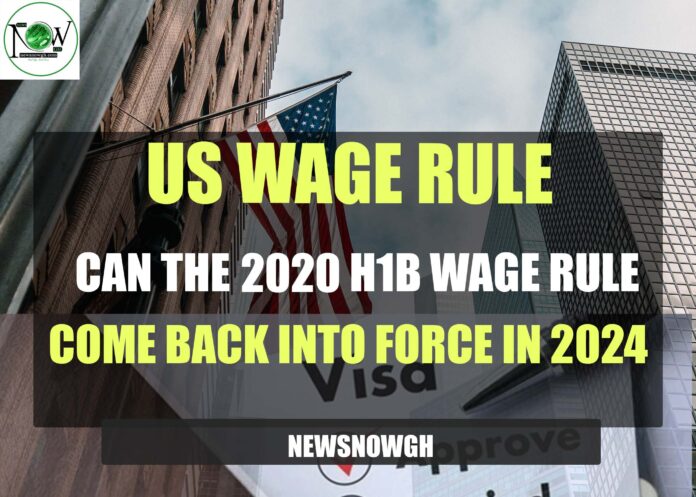Can the 2020 H-1B Wage Rule Come Back into Force in 2024? | US Wage Rule
The Trump administration’s 2020 H-1B salary rule aimed to increase the minimum pay for foreign experts, perhaps driving them out of the American job market. This rule provides clues about future immigration policies, particularly in light of the potential of Trump’s reelection.
The contentious 2020 regulation about H-1B visas, which was implemented by Donald Trump’s previous administration, may offer clues into prospective future immigration rules if he wins the forthcoming election and takes back the White House. Even though this regulation was ultimately overturned, businesses and international professionals alike are still affected by its ramifications.
An Overview of the 2020 H-1B Wage Regulation
The U.S. Department of Labor (DOL) published a regulation in October 2020 that sharply raised the minimum salary that firms are required to pay employment-based immigrants and holders of H-1B visas. Due to the requirement that businesses offer salaries significantly higher than previously necessary, this law was perceived by many as an attempt to price foreign professionals out of the American labor market.
Employers had to pay H-1B professionals the real wage given to comparable U.S. workers or the going rate in the labor market, whichever was higher, before the implementation of this rule. However, a sharp spike in these earnings resulted from a policy implemented by the Trump administration, which primarily affected foreign-born scientists and engineers.
Modifying the Wage Formula
Immigration lawyers contended that to artificially boost needed salaries, the Trump administration had altered a mathematical calculation in its wage guideline. There were notable disparities between the DOL’s new wage decisions and private sector salary surveys, which made this shift quite clear.
The DOL states that the typical wage for workers in a particular occupation in a particular area should be reflected in the prevailing wage. Opponents of the policy countered that the new rule pushed pay well beyond what the statistics showed.
Effects on Employment and Lawsuits
The 2020 H-1B salary rule affected international workers and employers in a big way. The following are the main effects:
- Increased Salary: The National Foundation for American Policy reports that entry-level pay for some jobs, such as petroleum engineers, may increase by 100%. In several instances, the minimum wage requirements for common vocations increased by 200% or more.
- Employers found it more difficult to hire foreign professionals under the H-1B program or to sponsor them for permanent residency as a result of these sharp wage increases.
- Legal Vulnerability: Because the rule was first proposed as an “interim final” regulation, it was open to legal objections.
- Court Opinion: U.S. District Judge Jeffrey S. White invalidated the rule on December 1, 2020. The judge criticized the Trump administration’s disregard for the law, particularly its circumvention of the Administrative Procedure Act’s mandated public comment period (APA).
Initiatives to Bring Back the Wage Rule
The Trump administration issued a final rule in January 2021 to retry enforcing the DOL regulation, notwithstanding the earlier failure. The goal was the same: by increasing salary requirements, the U.S. labor market would become less accessible to professionals who were born outside of the country.
But there was a lot of protest to this action. The U.S. Chamber of Commerce and other organizations filed an updated complaint in March 2021, claiming that the regulation will raise the qualifying threshold for foreign workers by limiting access to H-1B visas to individuals with abilities equivalent to a master’s degree.
Present Situation and Prospects for the Future
Shortly after the final rule was published, the Biden administration chose not to defend the rule. The Department of Labor requested public feedback on the methodology for determining prevailing wages in April 2021, suggesting a possible departure from the Trump administration’s approach.
The DOL suggested that the regulation would be permanently canceled when it pushed its proposal to increase the prevailing salary rates for the PERM and H-1B visa programs to its long-term agenda in June 2023. The rule’s future is questionable because the DOL has not taken any additional action on it.
Conclusion
The 2020 H-1B salary rule serves as a timely reminder of the substantial effects that immigration laws in the United States can have on foreign professionals and businesses alike. Businesses and international workers will be closely monitoring any indications that a second Trump government would bring back similar restrictions as the next election draws near.
Follow us on Newsnowgh.com to stay updated on the latest information regarding work permits, visa application processes, paths to permanent residency, and visa-sponsored employment.


